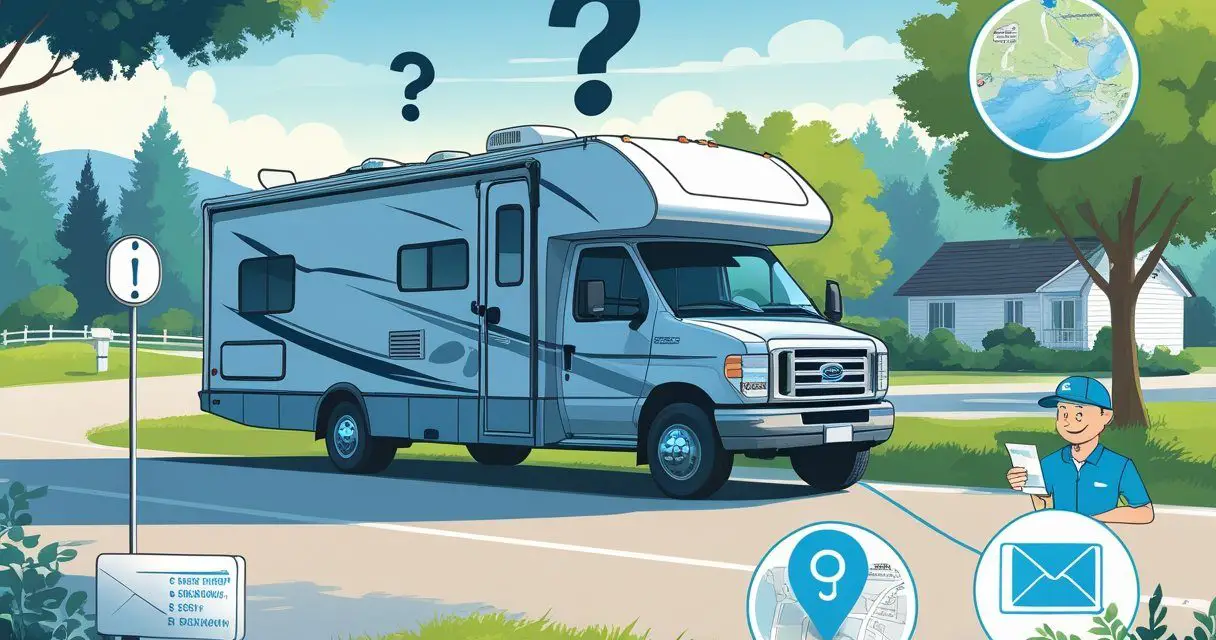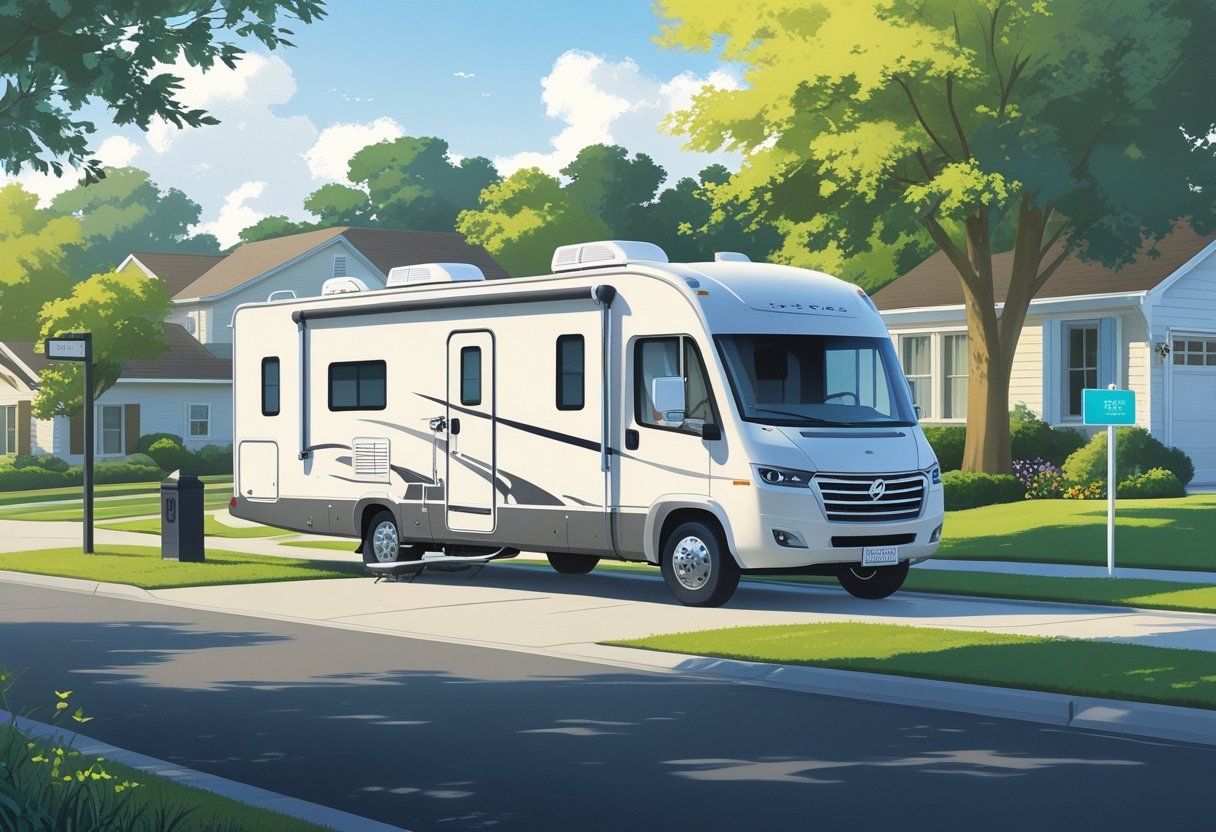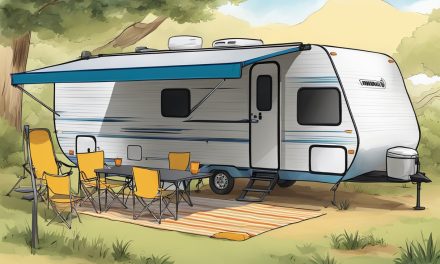Many people wonder if they can get a real address for their RV, especially as more folks choose life on the road. Yes, an RV can have an address, but it depends on where the RV is parked and local laws about using RVs as homes. Some places allow RVs to use the same address as the property they’re parked on, while others have strict rules against it.
Would you like to save this article?
The answer gets more complex when someone wants to live in their RV full-time. Different states and counties have different rules about RV living, and some places are starting to change their laws to help with housing shortages. Getting an address involves understanding legal requirements, mail forwarding services, and residency rules.
For RV owners, having an address affects everything from getting packages to filing taxes and voting. There are several ways to establish an address while living in an RV, and each option comes with its own benefits and challenges that every RVer should know about.
What It Means for an RV to Have an Address
Having an address for an RV involves understanding two main types: physical addresses for legal residence and mailing addresses for receiving mail. RV owners need addresses to meet legal requirements, access services, and maintain communication while traveling.
Difference Between Physical and Mailing Addresses
A physical address shows where someone actually lives or parks their RV. This is their legal residence for voting, taxes, and official documents.
A mailing address is where mail gets delivered. For RV owners, this might be completely different from where they park.
Physical Address Requirements:
- Must be a real location
- Used for legal residence
- Required for voter registration
- Needed for tax purposes
- Must allow overnight parking
Mailing Address Options:
- Mail forwarding services
- Family or friend’s address
- Post office boxes
- Commercial mail services
Many RV owners use their parents’ address as their physical address while traveling. Others establish residency in RV-friendly states like Texas, Florida, or South Dakota.
The key difference is that physical addresses prove where someone lives legally. Mailing addresses just handle mail delivery.
Why RVs Need Addresses
RV owners must have addresses to handle basic life requirements. Banks, insurance companies, and government agencies all require addresses for their records.
Legal Requirements:
- Driver’s license renewal
- Vehicle registration
- Tax filing
- Voting registration
- Court documents
Financial Services:
- Bank accounts
- Credit cards
- Insurance policies
- Loan applications
Healthcare and Services:
- Medical records
- Prescription deliveries
- Emergency contacts
- Background checks
Without an address, RV owners cannot access most services. They face problems opening bank accounts, getting insurance, or even receiving medical care.
Many full-time RV travelers use mail forwarding services. These companies provide both physical and mailing addresses in RV-friendly states.
Some RV owners maintain a home base address even when traveling full-time. This gives them stability for official paperwork while still allowing freedom to travel.
Legal Requirements for RV Addresses
RV owners must navigate both state-level regulations and local city or county rules when establishing a legal address. These laws vary significantly across different jurisdictions and can impact everything from voting rights to vehicle registration.
State Laws and Regulations
Each state has different rules about using an RV as a primary residence and establishing a legal address. Some states are more RV-friendly than others when it comes to domicile requirements.
Mail forwarding services are legal in most states for RV owners. These services provide a physical address that meets state requirements for vehicle registration and voting. Popular RV-friendly states include Texas, Florida, and South Dakota.
States typically require proof of physical presence to establish residency. This might include:
- Utility bills or lease agreements
- Bank statements showing local address
- Vehicle registration documents
- Voter registration records
Tax implications vary by state. Some states have no income tax, making them attractive for full-time RV living. Others require specific documentation to prove residency status.
Vehicle registration laws differ significantly. Some states allow RV owners to register their vehicles using a mail forwarding address. Others require a traditional residential address.
City and County Ordinances
Local governments often have stricter rules about RV parking and residential use than state laws. These ordinances can significantly impact where RV owners can legally establish an address.
Many cities prohibit using RVs as permanent residences on private property. Zoning laws typically restrict RV living to designated areas like RV parks or campgrounds.
San Jose recently started banning RV street parking in designated areas. Los Angeles has been working to address RV homelessness through new storage programs and housing initiatives.
Common local restrictions include:
- Time limits on RV parking (often 72 hours)
- Setback requirements from property lines
- Utility connection restrictions
- Waste disposal regulations
Some cities are creating designated RV parking areas. Others are becoming more restrictive about where RVs can be parked overnight or used as residences.
Property owners may face fines if they allow RVs to be used as permanent housing on their land. Local code enforcement agencies actively monitor these violations in many areas.
Options for Establishing an Address While Living in an RV
RV dwellers have several practical ways to get a legal address for mail, voting, and official documents. The most common options include using a trusted contact’s address, signing up for mail forwarding services, or establishing residency at RV parks.
Using a Friend or Family Member’s Address
Many RV owners use a family member’s or close friend’s address as their legal residence. This option works well for people who have trustworthy contacts willing to help.
The person must agree to receive mail and packages on behalf of the RV owner. They should also be comfortable forwarding important documents when needed.
Benefits of this approach:
- No monthly fees
- Personal touch with mail handling
- Easy to set up
Potential drawbacks:
- Relies on someone else’s availability
- May strain relationships if overused
- Limited control over mail timing
RV owners should have clear agreements about mail handling. Some people set up specific days for mail pickup or forwarding. Others arrange for photos of mail to be sent via text message.
This method works best for people who stay in touch regularly with their contact person. It’s important to keep the arrangement simple and not overwhelming for the helper.
Mail Forwarding Services
Commercial mail forwarding services provide a permanent address for RV travelers. These companies receive mail and forward it to wherever the RV owner is located.
Popular services include Escapees, Good Sam, and Americas Mailbox. Most charge monthly fees between $10 to $30.
Key features of mail services:
- Virtual mailbox viewing – See mail online before forwarding
- Package consolidation – Combine multiple packages into one shipment
- Mail scanning – Digital copies of important documents
- Forwarding flexibility – Send mail to campgrounds or general delivery
These services often provide addresses in states with no income tax. This can save money for full-time RV residents.
Most services require customers to update their forwarding address regularly. Some offer apps that make address changes quick and easy.
The main downside is the monthly cost. However, many RV owners find the convenience worth the expense.
RV Parks and Campgrounds as Addresses
Some RV parks allow long-term residents to use the park’s address for mail and legal purposes. This works best at parks that cater to full-time RV living.
Many parks offer mail services as part of their amenities. They hold packages and sort mail for residents with assigned lot numbers.
Requirements typically include:
- Long-term rental agreement (usually 6+ months)
- Additional fees for mail services
- Proof of residency at the park
This option provides stability for RV owners who stay in one area for extended periods. It’s particularly useful for people who work remotely or have seasonal jobs.
Some parks partner with local post offices to provide official addresses. Others simply hold mail as a courtesy service.
The main limitation is that this only works while staying at that specific park. Moving to a new location means finding a new address solution.
Full-Time RVers: Residency, Taxes, and Voting
Full-time RVers must establish legal domicile in one state to handle taxes, voting, and official documents. States like South Dakota, Texas, and Florida attract RVers with favorable tax laws and simplified residency requirements.
Domicile vs. Residence
Domicile refers to a person’s permanent legal home for tax and voting purposes. Residence is where someone physically lives at any given time.
For RVers, domicile stays the same even when they travel between states. They can change their residence daily but keep one legal domicile.
Popular domicile states include:
- South Dakota (no state income tax)
- Texas (no state income tax)
- Florida (no state income tax)
South Dakota recently changed its laws in 2023. The state now requires 30 days of residency before voting registration. Mail-forwarding services can no longer serve as permanent addresses for some purposes.
Registering Vehicles and Insurance
RVers must register their vehicles in their domicile state. They also need insurance that covers travel across state lines.
Most states require proof of residency for vehicle registration. This often means showing utility bills or lease agreements.
Required documents typically include:
- Proof of domicile address
- Vehicle title or previous registration
- Insurance documentation
- Valid driver’s license
Some states offer easier registration processes for RVers. They accept campground receipts or affidavits as proof of residency.
Insurance companies offer specialized RV policies. These policies cover personal belongings and provide liability protection in all states.
Handling Taxes and Legal Documents
RVers file taxes in their domicile state regardless of where they travel. They must follow that state’s tax laws and deadlines.
States without income tax make tax filing simpler. RVers only need to file federal returns in these states.
Important tax considerations:
- File in domicile state only
- Track travel expenses for deductions
- Maintain detailed records
- Consider state sales tax differences
Legal documents like wills and medical directives follow domicile state laws. RVers should update these documents when changing domicile.
Mail-forwarding services help manage important documents. These services scan and forward mail to RVers anywhere in the country.
Some states now restrict using mail-forwarding addresses for official purposes. RVers must verify current requirements before establishing domicile.
Getting Packages and Mail on the Road
RV travelers can receive mail and packages through postal services, pickup lockers, and digital mail forwarding. These options let people stay connected while traveling without missing important deliveries.
Receiving Mail at Postal Locations
The US Postal Service offers general delivery for people without permanent addresses. This free service lets RVers pick up mail at any participating post office. The local postmaster decides how long someone can use this service.
RVers can also rent a P.O. Box in areas where they plan to stay for weeks or months. The USPS website makes it easy to rent boxes online. People just pay online and pick up keys in person.
Private mail services work too. UPS Stores and FedEx locations rent mailboxes. Local mailing centers often provide similar services.
Campground offices sometimes accept mail deliveries. RVers should call ahead to ask permission. Most campgrounds don’t mind occasional packages but won’t handle frequent deliveries.
Using Package Lockers
Amazon Lockers provide secure pickup spots in thousands of locations. These lockers work well in cities and towns along travel routes. RVers can time their deliveries around their travel plans.
The lockers are usually found at:
- Grocery stores
- Gas stations
- Shopping centers
- Pharmacies
Amazon sends a pickup code when packages arrive. People have several days to collect their items before the package gets returned.
Other companies offer similar locker services. UPS Access Point locations let people pick up packages at local businesses. FedEx has pickup locations at many stores too.
Digital Mail Services
Virtual mailbox services scan physical mail and turn it into digital files. Companies like Anytime Mailbox have over 675 locations across the US. Monthly plans start around $10.
These services can forward packages to campgrounds or other locations. Users control everything through smartphone apps. They can view mail instantly and decide what to forward.
Escapees RV Club offers mail services designed for RVers. They provide mailing addresses in Texas, South Dakota, and Florida. Annual plans start at $95 and include package forwarding.
The service handles all mail types including certified and registered mail. Members can call, email, or use online tools to request forwarding.
Common Challenges and Solutions for RV Addresses
RV dwellers face specific problems with banks, healthcare providers, and employers who expect traditional residential addresses. These issues can create barriers to accessing essential services and maintaining financial stability.
Banking and Identification Issues
Banks often reject mail forwarding services as valid addresses for new accounts. Many financial institutions require proof of physical residence through utility bills or lease agreements.
Common banking problems include:
- Account applications being denied
- Difficulty getting credit cards or loans
- Problems with identity verification
- Issues receiving important bank documents
RV owners can solve these problems by using a domicile service in states like Texas, Florida, or South Dakota. These services provide a legal residential address that banks accept.
Some credit unions are more flexible than traditional banks. They may accept alternative address verification methods. Local community banks sometimes work with RV customers on a case-by-case basis.
Another option is maintaining accounts with online banks. These institutions often have less strict address requirements. They focus more on digital verification methods.
Healthcare and Insurance Access
Finding healthcare providers becomes harder without a fixed address. Many doctors’ offices require local addresses for patient records and insurance billing.
Key healthcare challenges:
- Difficulty scheduling appointments
- Problems with insurance coverage areas
- Prescription refill complications
- Emergency contact information issues
RV travelers can use urgent care centers and retail clinics for basic medical needs. These facilities accept patients from any location. They don’t require established patient relationships.
Telemedicine services help with routine consultations. Many insurance plans now cover virtual doctor visits. This option works well for prescription renewals and follow-up care.
Some insurance companies offer nationwide coverage networks. These plans work better for RV lifestyle than local HMO plans. PPO insurance typically provides more flexibility for traveling.
Remote Work and Internet Connectivity
Employers need reliable contact information and consistent internet access from remote workers. RV locations often have poor cell tower coverage or slow internet speeds.
Workplace connectivity solutions:
- Cellular boosters improve weak signal strength
- Satellite internet provides coverage in remote areas
- Mobile hotspots offer backup internet options
- Starlink delivers high-speed internet almost anywhere
Many RV workers use virtual office services for professional mailing addresses. These services forward mail and provide phone answering services. They help maintain a professional business presence.
Co-working spaces in RV-friendly towns offer reliable internet and professional meeting areas. Many RV parks now provide dedicated work spaces with high-speed internet connections.
Backup power systems keep work equipment running during outages. Solar panels and generators ensure consistent power for laptops and internet equipment.








